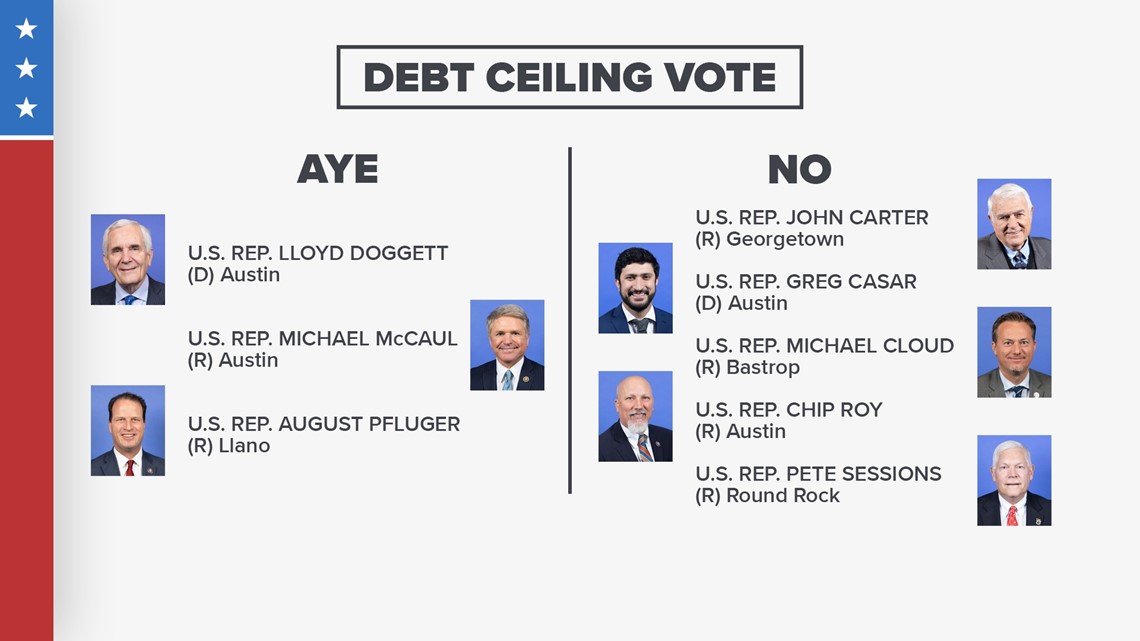AUSTIN, Texas — In this week's edition of Texas This Week: It's been dramatic week in Texas politics, with Republican lawmakers fighting over property taxes, a day-long special session for the House of Representatives and new developments in the impeachment of Texas Attorney General Ken Paxton. James Barragán, politics reporter for The Texas Tribune, joined KVUE's Ashley Goudeau to talk about the fight between the state's top leaders.
Three things to know in Texas politics
1. Congress sends bill to raise debt ceiling to the president's desk
It looks like the U.S. won't default on its loans. After much debate, Congress sent the Fiscal Responsibility Act to the president. The bill raises the debt ceiling but also contains contentious provisions, such as spending cuts and job requirements for people getting federal food assistance, which led to a mixed bag of votes.
Looking at the Central Texas delegation, U.S. Reps. Lloyd Doggett (D-Austin), Michael Mccaul (R-Austin) and August Pfluger (R-San Angelo) voted for the bill to keep America from defaulting. Reps. John Carter (R-Round Rock), Greg Casar (D-Austin), Michael Cloud (R-Victoria), Chip Roy (R-Austin) and Pete Sessions (R-Waco) voted against the bill.
Over in the U.S. Senate, Sen. John Cornyn (R-Texas) voted for the bill while Sen. Ted Cruz (R-Texas) voted against it.




2. Texas House board of managers announces attorneys in Ken Paxton impeachment
On Thursday, the Texas House of Representatives' board of managers, who are in charge of the impeachment of Texas Attorney General Ken Paxton, introduced the two attorneys who will present the case against Paxton during the Senate trial. Dick DeGuerin and Rusty Hardin are two heavy-hitters, with more than 100 years of trial experience between the two of them and a list of celebrity and high-profile clients.
"The people of the state of Texas are entitled to know whether their top cop is a crook," Dick DeGuerin said during a news conference.
The Senate has not set the rules for the hearing yet, but the Houston-based attorneys are calling for a completely public, transparent proceeding.
3. Gov. Greg Abbott appoints interim attorney general
Gov. Greg Abbott appointed John Scott, the former Texas secretary of state, as interim attorney general to run the office while Paxton is suspended and awaits the Senate hearing. Scott took the oath of office on Wednesday.
The Fort Worth attorney is not new to the office. Scott served under Abbott when he was the attorney general, working as the deputy attorney general for civil litigation.
James Barragán on the property tax fight
The Texas Legislature adjourned sine die on Monday, but not for long. Just a few hours later, Gov. Abbott called lawmakers back to the Capitol for a special session and charged them with passing property tax relief and a bill increasing penalties for human smuggling.
The next day, the conflict between the House and Senate over property taxes really came to a head when the House passed a bill decreasing the school tax rate, but without an increase to the homestead exemption; passed a bill on the second item on the special session agenda; then adjourned sine die.
James Barragán, politics reporter for The Texas Tribune, joined KVUE's Ashley Goudeau to talk about the growing rift under the dome.
Ashley Goudeau: I don't know about you, but to me, this past week felt like a month. So much has happened underneath that pink dome.
James Barragán: "Certainly. Yeah. I mean, we were all kind of looking for that end of the session, and it just kept going and kept going and kept going. So, yes, definitely. It has taken a couple of years off my life."
Ashley Goudeau: Right. Let's talk about it. Let's start with Monday – it was the 140th day of the regular session, aka the last day, sine die. There were a lot of priority bills for the state's top three lawmakers, top three leaders, excuse me, that didn't make it over the finish line.
James Barragán: "Yeah, I mean, I think the first one has definitely got to be property taxes, because even until that last day, which as you know, Ashley, is just a day of pomp and circumstance and celebration, lots of families. But this day unusually started with, you know, last-minute deals trying to be made. And we waited for hours and hours and hours for that not to happen. So property tax is definitely a big one. School vouchers, we knew, had been a no-go for a while, but still it officially died that day and a couple of border security bills – super important topic for Texans, super important topic for Gov. Greg Abbott and for both chambers, but somehow did not get done. So they definitely left a lot of points on the board that they had wanted to get done."
Ashley Goudeau: Yeah. Gov. Greg Abbott wasted no time in calling a special session. In fact, the notice came out about three hours after the Senate adjourned that there would be a special session.
James Barragán: "Yeah, it was not a surprise to any of us in the press corps. You know, I was at a at a celebration of sine die when we got the official email that the special session had started three minutes ago. So the governor wants to show that he's eager to get these issues done. And he did so on Monday night."
Ashley Goudeau: You know, you kind of mention this a little bit, but lawmakers in both of the chambers spent much of the day Monday trying to come to an agreement on property tax relief. Before we really dive into all of that drama and everything that happened after that, I want you to remind our viewers what the House wanted versus what the Senate wanted when it came when it comes to property taxes.
James Barragán: "Well, the session started off with the governor saying that he wanted the biggest property tax, well the biggest tax cut in general in state history for property owners or for Texans. So both chambers agreed. Lt. Gov. Dan Patrick and House Speaker Dade Phelan said, 'Yes, let's run on this. We're going to try our best.' But they had very different approaches. The House wanted to do an appraisal cap and the Senate was very big on a homestead exemption increase from the current $40,000 to $100,000, which would help homeowners. They had gone back and forth, back and forth, a big tug-of-war between the two chambers, with them not really communicating a whole lot and sort of just saying, giving passive aggressive-like side comments to each other. And that continued up until the end nearly when the governor came out trying to broker a deal. And then in the last minute, he sort of came up with his own idea about rate compression."
Ashley Goudeau: On Tuesday, just before the Senate gaveled in for the first special session, Lt. Gov. Dan Patrick made some pretty damning comments about Speaker Dade Phelan and why he was so set on appraisal caps. Talk to us about really the meaning behind some of what he said there.
James Barragán: "Yeah, I mean, the animosity between Speaker Phelan and Lt. Gov. Patrick has been no secret for anybody that watches the Capitol. And I think this is the biggest difference of opinions, the biggest acrimony between a speaker and a lieutenant governor that I've seen in my time covering the Texas Legislature, because these guys, it's very clear they do not like each other."
Ashley Goudeau: The Senate then meets passes its property tax relief bill, which reduces the school tax rate, that compression, and gives homeowners a $100,000 homestead exemption. A few hours later, the House meets really throws down the gantlet in what the House did on Tuesday. Tell us all about it.
James Barragán: "Yeah, I mean, it really was a sort of take-it-or-leave-it situation that the House put the Senate in. So I had mentioned that the governor had said he wants that compression of the property tax rate for school districts brought down with some payments from the State, which is an idea that conservative think tanks like the Texas Public Policy Foundation have pushed for years. It is very difficult to achieve because it's easy to do now when we have a budget surplus, but it gets harder to do when we do not have the money around. And it is something that might necessitate cuts to public education in the future, which is the concern. It's very interesting to see now the governor saying, 'Yes, this is the plan I want to go with,' and the House saying, 'OK, we'll go along with it. That wasn't our plan to begin with, but we'll go along with it.' And then the lieutenant governor saying on his end in the Senate, 'Sure, we'll do some rate compression. But our main source of property tax relief is going to be a homestead exemption because it would benefit homeowners the most,' much more than, I think the compression rate, which benefits both homeowners and businesses, which is a big Republican establishment support area. But in the Senate, you know, they really want to go for that homestead exemption. And it's put Dan Patrick at odds with people who are usually his political partners and allies."
Ashley Goudeau: Can they both come away from this claiming success or are we going to see winners and losers when this is all said and done, you think?
James Barragán: "No, I think at this point we've passed the Rubicon. I mean, I think one way that the governor can sort of save a situation if Dan Patrick gets the upper hand again is by saying, 'Hey, all I wanted is the biggest tax cut in state history.' But I think at this point, like I said, we've crossed the Rubicon. One has pointed their flag down on homestead exemptions. The other one says compression rate needs to go down until we eliminate the M&O taxes. And so they've planted their flags. And we're going to find out here in the next couple of months who's really in charge of the State of Texas in politics."

